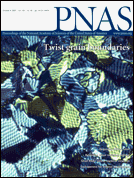News
Scientist's Cancer Research Featured in the October 4 issue of Proceedings of the National Academy of Sciences (PNAS)
Published October 03, 2005
 The San Diego Supercomputer Center (SDSC) helped a team from the J. Craig Venter Institute (JCVI) to sequence DNA samples from a number of cancer patients in order to locate any associated mutations. Detailed in this week's issue of PNAS, the team found many mutations in genes encoding protein kinases, a class of signaling enzymes that play important functional roles in the cell and frequently influence the onset and progression of cancer. The study was used to determine structural consequences of the observed mutations, thus linking them to their ultimate effects - such as cancer.
The San Diego Supercomputer Center (SDSC) helped a team from the J. Craig Venter Institute (JCVI) to sequence DNA samples from a number of cancer patients in order to locate any associated mutations. Detailed in this week's issue of PNAS, the team found many mutations in genes encoding protein kinases, a class of signaling enzymes that play important functional roles in the cell and frequently influence the onset and progression of cancer. The study was used to determine structural consequences of the observed mutations, thus linking them to their ultimate effects - such as cancer.
"I used global sequence alignment provided by the Protein Kinase Resource (PKR) that we have developed at SDSC to assess statistical significance of observed mutations," said Sasha Buzko postgraduate researcher at SDSC. "In many cases, residues introduced by a mutation did not standout in the background of natural variability in the wild type of proteins within the same family as the target kinase. Thus, the JCVI team concentrated on those mutations that had caused significant deviations from the natural residue distribution."
In addition, using capabilities provided by PKR, the team produced models of kinases in question based on sequence alignments and structural templates. These 3D structures of the target proteins were used to map mutations and target proteins to evaluate changes.
For more information, visit the PKR Web site at www.kinasenet.org.

